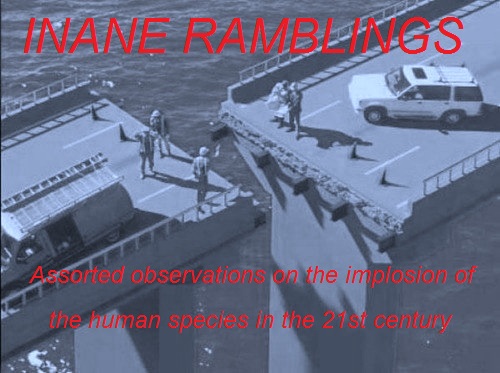Most everyone has heard of Six Degrees of Separation. So had I, but - I couldn't tell you exactly what it was. So I wik'd it. And - I still can't tell you exactly what it is. But I now know that it is or was 1. a play, 2. a Facebook application, and 3. a game of some sort involving actor Kevin Bacon. I still don't get that part of it, but I digress.
Six Degrees of Separation is also a theory which basically postulates that if Person A knows Person B, and Person B knows Person C, and Person C knows Person D, and Person D knows Person E, then Person A must know Person E. (You can substitute colors or General Motors car models for the letters - it works out the same.) Of course like any theory, this one had to be tested. And tested it was. And - is still being tested. Theorists, mathematicians, and psychologists chose up sides to argue either for or against the validity of the theory. And, while interesting enough, the point of the theory is in my opinion, moot.
Growing up in a small city in Southwest Virginia, we had three radio stations: rock, country and what they used to call easy listening (Tony Bennett and Henry Mancini and the like). There were three TV channels. So, at any given time I could usually tell with some degree of certainty what TV show my neighbors were watching, or to what radio station the car going down the street was tuned. There was one newspaper, so everybody got the same slant on everything. And, since it was such a small city, the six degrees theory would absolutely have proven true there; it was probably closer to three or four degrees.
In other words, we were connected by the sameness, the sheer banality of our existence.
But that is not my point.
Today there are thousands of TV and radio stations. There's the internet. There are billions of hexadecimal bits of voice, data, and images pinging off satellites every second of every day. People located on three different continents can engage in a web meeting, each seeing and hearing the other as if they were in the next room. Today, when you take photos of your vacation, you do not have to wait until you're back home and the photos are developed so you can have everyone over to watch "slides". Thanks to cell phone cameras, your friends and co-workers can see them in real-time. As it's happening. Today I could not begin to tell you what TV station my neighbors are watching, or if they're listening to their iPod, or playing online Scrabble with 1,500 other people. Today, there are dozens of social networking sites where people can catch up on every minute detail of what you are thinking, feeling and doing at any moment. They even give you emoticons to communicate your mood, if you don't feel like typing it out.
But that is also not my point.
Several years back I was driving home from somewhere or another. It was late at night and there was nothing much on the radio. I happened upon a person talking about the unequal relationship between society and technology. He noted that society was foolishly embracing technology as some kind of ethereal, benevolent savior. Foolishly because, as he noted, society needs technology, whereas technology does not need society. Technology is decidedly not human, and we of course are 100% human. Technology does not need food, water, or an HMO. It does not care if the power grid on the East coast of the United States goes down, or if a computer virus infects tens of thousands of users. Technology will not shed the first tear if every satellite, receiver, transponder, router and iPhone simultaneously burst into flames. Yet we cling to the belief that technology has somehow brought us - the roughly six billion inhabitants of planet Earth - closer together.
Whereas I believe the exact opposite is true.
It is specifically because we have so many options that we are now more engaged with the technology than we are each other. Because of the aforementioned social networking sites, I know that this or that acquaintance had a "bad day", but often I do not have the opportunity to look into that person's eyes and relate - one human being to another - to their angst. Or that another downloaded a song from their favorite artist, but we will not sit on opposite ends of a sofa and listen, with one or the other (or both) breaking into an air guitar solo.
Don't get me wrong - I think it's great that we have the technology. We can post photos and videos, and send little messages to each other. We can engage in general silliness or send heartfelt best wishes or condolences. But what's missing here is the human touch, and we humans like physical contact. We are a touchy-feely species.
So here we are, the roughly six billion inhabitants of planet Earth, enveloped within a virtual blizzard of electromagnetic waves, but in many ways further apart than at any other time in history. But, there are things we can do. Look up that friend that lives across town and invite them to lunch. Have your parents or in-laws over for dinner. Take a batch of fresh-baked cookies (or a pitcher of margaritas) to that neighbor you occasionally nod to over the backyard fence. Turn off the TV, log off the computer, turn off the cell phone. Get out. Go for a walk, and smile at anyone you may encounter along the way. Go to a park. Give your spouse or child or significant other a hug and a kiss the next time you see them. Tell them what they mean to you. Help a child with their homework, or an elderly neighbor with their yardwork. Do volunteer work at a retirement home, or hospital or hospice. And know that although you are but one of six billion, every day you have an opportunity to enrich other's lives, to connect on a personal level, to become more human.
And then - then you'll know that the number of degrees which separates us has been reduced by one.
skip to main |
skip to sidebar

About Me

- Rusty Wood
- Rusty Wood is a pseudonym, which I think is French for "fake name". Although most of my writing is (intended to be) humorous, I will wax philosophical from time to time. In any event, I hope you enjoy my work - whoever I am.
Total Pageviews
What Others Are Reading:
-
Marietta, GA – Thirty-three year old divorced father of two Matt Poole insured that everyone in attendance at his friend Rodney Spence’...
-
Well, it appears the truce in the Battle of the Sexes is holding and everyone is trying to get along and be sensitive to each other’s needs ...
-
I know, right? This simple three word oxymoron is both a declarative statement AND a question rolled into one stupid little quip. ...
-
Every good writer knows you never begin an article with stats. So, here we go: An estimated 22 million Americans and millions of others ...
-
Tis the season. For decking of halls and merry gentlemen resting, and riding horse-drawn sleighs over the river and through the woods to...
Labels
1984
2008
2010
advice
alienation
Angry Birds
authoritarianism
bad drivers
Battle of the Sexes
big brother
big pharma
binge-buying
blog for rent
boredom
Bret Michaels
cats
celebrity worship
Christmas
Christmas shopping
circle of life
cliché
collective soul
commercialism
Compassion
consumerism
corporate-speak
country music
covid-19
cyber-verse
de-evolution
Deceit
depression
disco
dog days
dog-and-pony show
driving while stupid
dry humor
Duct Tape
dysfunction
entrepreneurism
erectile dysfunction
escapism
etiquette
excuses
Facebook
Fatalism
fear tactics
Fifty Shades of Grey
football
forever lazy
fun on the cheap
getting older
Greatest Inventions
green products
Halloween
High School Musical
high-rise buildings
Hillary Clinton
holiday survival guide
home of the future
Horror Movie
humor
Infomercial
internet marketing
Jennifer Love Hewitt
jobs
Kim Jong-il
Kurt Vonnegut
Lindsay Lohan
Listening
marijuana
Matrix Reloaded
meaningless phrases
metaphorical garden
middle class
Milkgate
Mister President Contest
Mitt Romney
Monopoly Money
movies
new channels
New Year’s resolutions
New York Giants
NFL
Nietzsche
Octoberfest
Oh-Oh decade
Oprah
parenthood
peace
People’s Republic of China
perception
phrases that spell trouble
ping-pong diplomacy
planting a seed
platitudes
politics
President Obama
presidential election
reality tv
Rearranging the Deck Chairs
relationships
retrospective
Santa Claus
satire
self-fulfilling prophecy
senility
Sheep to the Slaughter
shirking responsibility
side effects
six degrees of separation
social networking
society
spam
sports
Star Wars
stupid quiz
summer
summer replacement shows
Super Bowl
technology
tenacity
the internet
Things Men Won’t Say
things that bug me
Things That Still Work
Tiger Woods
TMZ
trade imbalance
turning a page
tv
Twilight Zone
vampire-themed movies
Velcro
virtual reality
Volunteerism
wardrobe malfunction
Washington Redskins
ways to beat the heat
ways to drive your man wild in bed
Wii
working-class
workplace
world population
writing



